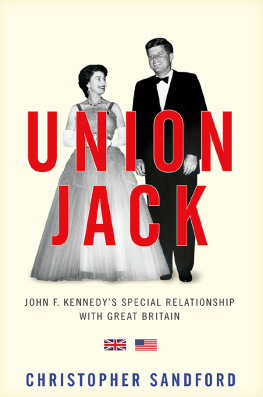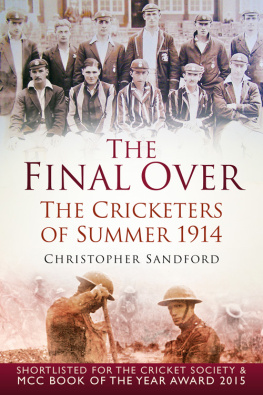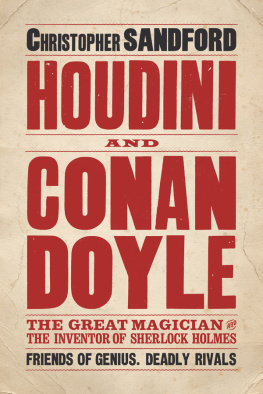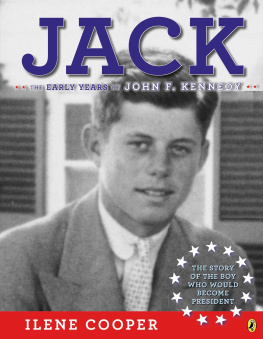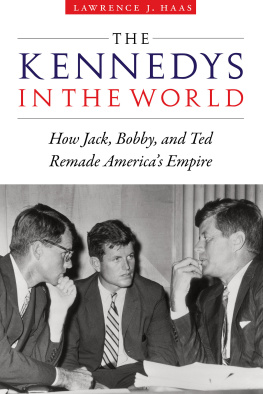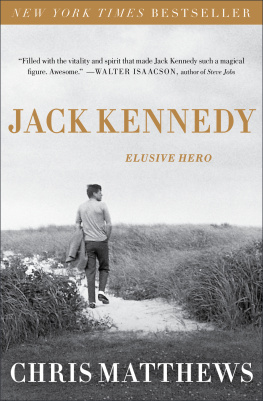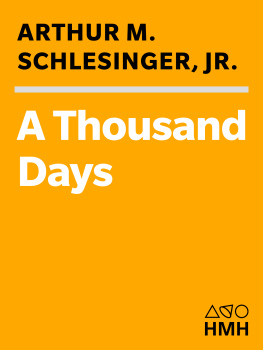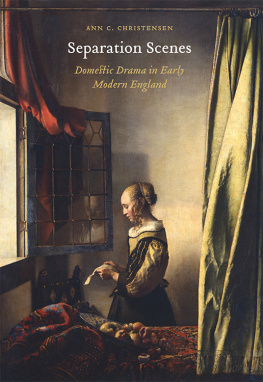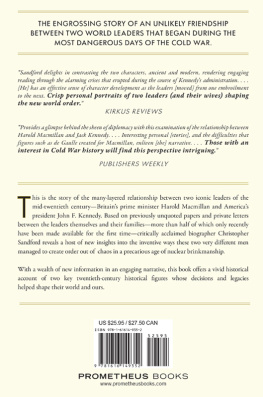
ACKNOWLEDGMENTS

This is not a biography of John F. Kennedy. Anyone interested in reading more about the subject will find some suggestions in the bibliography at the end of the book. Instead, Ive written a study suggesting the ways in which Kennedy reacted to certain experiences he had of Britain and how these may have shaped some of his basic thinking as president. Thats not to say that he instinctively sympathized with British policy, particularly when it came to colonial affairs, or that he invariably sided with Britain in presenting a united and coordinated front to the world. He did not. Kennedy was of course motivated first and foremost by American self-interest as he saw it. His intellectual and sentimental (if not romantic) attachment to the aristocratic British political tradition he so thrillingly read about in David Cecils book, The Young Melbourne, was neither the determining factor nor the principal ingredient in the Atlantic special relationship as it played out from January 1961 to November 1963. But Kennedy did, nonetheless, understand the hard fact of Britains steady course of national decline management in the postwar years and, all else being equal, proved himself ready and willing to help ease his countrys historic ally through its sometimes painful passage from the first to the second division of the worlds great powers. Its also true that at an intellectually impressionable age in his early twenties, Kennedy thought deeply about issues of appeasement and armament, and that these same issues resonated with him in determining his attitude to the Soviet Union a generation later.
No gift of psychiatric interpretation is needed to see how far John Kennedy differed from his own father, Joseph, the US ambassador to Great Britain from 1938 to 1940, in his admiration of Britains initial stand against Hitler, and how far he was later prepared to go to accommodate the countrys lingering ambitions to enjoy a seat at the international top table. An example of this came at Nassau in December 1962, when Kennedy agreed to continue to provide Britain with its own independent nuclear deterrent, a decision taken over the vocal objections of most of his senior staff. Later explaining this arrangement to the queen, British prime minister Harold Macmillan wrote, It has been a hard and at times almost desperate struggle to maintain the two concepts of interdependence and independence. But I must pay tribute to President Kennedys sense of fairness and willingness to be persuaded by argument and over-rule those of his advisers who were not sympathetic to our views. This was a significant moment in Anglo-American relations, and its strategic consequences remain with us today. Its perhaps the chief example, but not the only one, of the way in which Kennedys deep-seated affinity for Britain and the British people sometimes overcame the more pristine logic of a man like his defense secretary Robert McNamara, a supremely rational systems analyst not given to emotional effusions on behalf of even a close ally. Britain was extremely lucky that the outcome of the November 1960 presidential election went as it did. This book hopefully shows why that was so, and how it was that the youthful John Kennedy developed a unique and intimate relationship with certain British figures whom he later turned to during the most critical period of the Cold War. Even today, it seems Britain has yet to resolve the central dilemma of the postwar special relationship: whether it should best be seen as a loyal but financially strapped European ally, a key nuclear superpower, or what amounts to the fifty-first American state. No US president has stamped a more profound imprint on that debate than Kennedy.
For archive material, interviews, or advice, I thank the following: Abacus; Alibris; the American Conservative; Connor Anderson; Laurie Austin; the Avon Papers at Birmingham University, United Kingdom; Andrew Baird; the Bodleian Library, Oxford; Book Depository; Bookfinder; the British Library; British Newspaper Library; Chronicles; the CIA; Companies House, London; Stephen Cooper; the Devonshire Collection at Chatsworth House; the Dwight D. Eisenhower Presidential Library, Abilene, Kansas; the FBI Freedom of Information Division; Tom Fleming; General Register Office, London; Tony Gill; Maryrose Grossman; Hansard; Tess Hines; Steven J. Hull; the John F. Kennedy Presidential Library and Museum, Boston; Barbara Levy; Antony Lewis; the Library of Congress; the Massachusetts Historical Society; Millbanksystems.com; National Security Archives; Hugh ONeill; Renton Public Library; Scott P. Richert; Rebecca Romney; the Salisbury Papers at Hatfield House; Sam Satchell; Seaside Library, Oregon; the Seattle Times; the Seeley Library, Cambridge, UK; the 1776 Coalition; the Spectator; Andrew Stuart; James Towe; UK National Archives; the US National Archives and Records Administration; the University Library, Cambridge, UK; University of Montana, Missoula; University of Puget Sound, Tacoma, Washington; Vital Records; Harold Waters; James Waters; Emily Watlington; the late Auberon Waugh; the late Harold Wilson; and Aaron Wolf.
And on a personal basis, I thank the following: Lisa Armstead; Rev. Maynard Atik; Pete Barnes; the late Ryan Boone; Hilary and Robert Bruce; Jon Burke; Don Carson; the late Pat Champion; Changelink; James Clever; Common Ground; Christina Coulter; Tim Cox; the Cricket Society; Celia Culpan; the Davenport; Monty Dennison; Micky Dolenz; the Dowdall family; John and Barbara Dungee; Rev. Joanne Enquist; Malcolm Galfe; the Gay Hussar; Gethsemane Lutheran Church; James Graham; the late Tom Graveney; Jeff and Rita Griffin; Charley Grimston; Grumbles; Alex Guyver; Steve and Jo Hackett; Masood Halim; Alastair Hignell; Charles Hillman; Alex Holmes; Hotel Vancouver; Jo Jacobius; the Jamiesons; Lincoln Kamell; Terry Lambert; Belinda Lawson; Todd Linse; the Lorimers; Robert Dean Lurie; Les McBride; Heather and Mason McEachran; Charles McIntosh; the Macris; Lee Mattson; Jim and Rana Meyersahm; Sheila Mohn; the Morgans; John and Colleen Murray; Kaiyo Nedd; Greg Nowak; Chuck Ogmund; Phil Oppenheim; Gary OToole; Valya Page; Robin Parish; Owen Paterson; Peter Perchard; Greg Phillips; Chris Pickrell; Roman Polanski; Premier Tutors; the late John Prins; Robert Prins; the Prins family; Ailsa Rushbrooke; Debbie Saks; Sam; the late Sefton Sandford; Sue Sandford; Sandy Cove Inn; Peter Scaramanga; Seattle C.C.; Fred and Cindy Smith; Rev. and Mrs. Harry Smith; the Stanley family; the late Thaddeus Stuart; Jack Surendranath; Danny Tetzlaff; Cynthia Tyrrell; Mary Tyvand; the late Robert Valade; Diana Villar; Lisbeth Vogl; the late Peter Way; Karin and Soleil Wieland; Debbie Wild; the Willis Fleming family; Heng and Lang Woon.
Copyediting of the manuscript was performed by Lee S. Motteler. The index was prepared by Robin B. James, MLS.
And a low bow, as always, to Karen and Nicholas Sandford.
SELECTED BIBLIOGRAPHY
Abel, Elie. The Missile Crisis. New York: Lippincott, 1966.
Acheson, Dean. Present at the Creation: My Years in the State Department. New York: W. W. Norton, 1969.
Adler, Bill, ed. The Eloquent Jacqueline Kennedy Onassis: A Portrait in Her Own Words. New York: William Morrow, 2004.
Alford, Mimi. Once Upon a Secret: My Affair with President John F. Kennedy and its Aftermath. New York: Random House, 2012.
Bradlee, Benjamin C. Conversations with Kennedy. New York: W. W. Norton, 1975.
Bundy, McGeorge. Danger and Survival: Choices about the Bomb in the First Fifty Years. New York: Random House, 1988.
Next page
